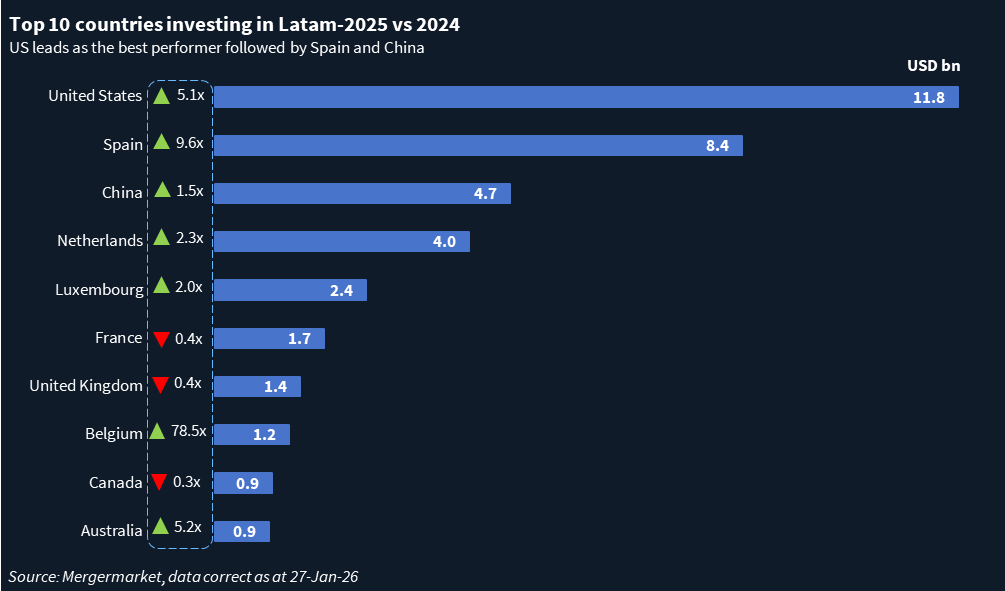Top Tech Trends for 2025
Lower interest rates and falling inflation are creating a more favorable environment for dealmaking, and advisors and executives who spoke with Mergermarket’s technology, media and telecommunications (TMT) team expect an uptick in activity in 2025. Businesses should be able to better focus on strategic planning now that the US presidential election is over and political uncertainty has eased. The incoming Trump administration is also expected to bring a shift in antitrust policy, potentially leading to a more merger-friendly regulatory environment.
Mergermarket has identified the top trends likely to drive M&A for TMT in 2025, ranging from financial pressures for traditional television networks and software-as-a-service providers to a resurgence in cryptocurrency adoption. Artificial intelligence is expected to drive acquisitions in that sector as well as spur buys across hyperscaler partners, liquid cooling technology that helps power data centers, cybersecurity and digital identity management.
New year to usher in next wave of AI buys
AI will have staying power in 2025 as it becomes embedded across industries and drives dealmaking in the public and private sectors.
Hyperscalers like Microsoft [NASDAQ:MSFT], Alphabet [NASDAQ:GOOG] and Amazon [NASDAQ:AMZN] are expected to remain active acquirers of AI, advisors and tech executives say, while newer providers such as Anthropic, OpenAI, Fireworks AI and Perplexity push the boundaries of how far the technology can go.
Perplexity, valued at USD 9bn in its last capital raise, is on the radar of several large tech companies as they weigh the high cost of training AI models and the formidable task of challenging Google in search, the advisors and executives said.
While predictions formed the first wave of AI, and generative AI popularized by ChatGPT marked the second wave, the third wave will be led by agentic software that can independently perform complex tasks and make decisions, Fireworks AI co-founder and CEO Lin Qiao recently said.
Agentics is expected to further accelerate AI adoption among enterprises, and it is an area Fireworks and other tech innovators will prioritize when making acquisitions, she said.
Acquihires will continue to fuel much of the M&A in the space, Qiao and the other sources noted. Cerebras Systems and Jasper are among the players who have told Mergermarket they are shopping for product teams, while Alphabet, Amazon, Microsoft and Meta [NASDAQ:META] widen their scope to include both nascent startups and established growth companies, they have said.
Consolidation is expected across the software layer where Anthropic and OpenAI operate as well as the hardware layer where Nvidia [NASDAQ:NVDA], Broadcom [NASDAQ:AVGO], Cerebras Systems, Advanced Micro Devices [NASDAQ:AMD] and Qualcomm [NASDAQ:QCOM] dominate, the sources said.
While horizontal AI players that provide enterprise customers with productivity tools for search and retrieval, analysis, and summarization are expected to remain M&A targets, so are vertical-specific application vendors like Harvey in legal, Cursor in software development and AlphaSense in financial services, said Timothy Young, CEO of Jasper, which provides AI solutions for marketing.
Hyperscaler partners primed for consolidation
A wave of consolidation may be on the horizon for hyperscaler partners as AI rollouts across the tech stack place data and analytics capabilities in the target zone.
AI and machine learning models require data integrity to work, and large language models can’t run unless the data is correct and in the right spot. As businesses across sectors continue their cloud migrations, integrators and managed service providers (MSPs) will continue to build muscle and sharpen their cloud skills through M&A, one sector banker said.
Unstructured data is more easily accessible than ever, causing companies to reassess their data strategies, said Scott Likens, chief AI engineering officer at PwC.
Partners of the hyperscalers (Amazon Web Services, Microsoft’s Azure and Google Cloud) are prime acquisition targets, a second sector banker said, pointing to last month’s acquisition of Mission Cloud Services, a provider of managed services and consulting services for public cloud platforms. CDW [NASDAQ:CDW] acquired the asset from Great Hill Partners, and the combined company will be CDW’s dedicated AWS practice.
CGI [NYSE:GIB][TSX:GIB] announced in December a pending merger with Daugherty, which specializes in AI, data analytics, strategic IT consulting and business advisory services for Fortune 500 clients.
Other strategic buyers that could be active include large consulting companies like Accenture [NYSE:ACN], KPMG, Deloitte, PwC, and Capgemini [EPA:CAP], the first banker said.
Gryphon Investors-backed 3Cloud is also a likely buyer, the second advisor said, noting the company made two acquisitions in the past two years.
Other potential sponsor-backed acquirors include Clayton Dubilier & Rice-backed Presidio, Quad-C Management-backed Apps Associates, Berkshire Partners-backed AHEAD, and Thrive, backed by Court Square Capital Partners and M|C Partners, the second advisor added.
Liquid cooling tech will be hot acquisition target
The liquid cooling technology space is ripe for M&A this year, according to data center bankers.
Data centers are surging in demand thanks to artificial intelligence and cloud computing, driving a need for data storage and processing power. Liquid cooling, which allows components to be entirely submerged in a non-conductive liquid, is another cooling option when fans and ventilation systems aren’t enough to cool the increasingly active data centers.
Big Tech giants like Google and Microsoft could be buyers of liquid cooling technologies amid efforts to be more sustainable, one of the bankers said, noting the technology helps bring down energy costs.
Potential targets include the pure-play data center company Vertiv [NYSE:VRT] and nVent, an electrical company that provides electrical enclosures, electrical and fastening, and thermal management solutions, a second banker said.
Divisions of industrial companies like ABB [SWX:ABBN], Schneider and Munters [STO:MTRS], which are all building liquid cooling technologies, could be potential targets for carve-outs, this banker said, adding that industrial bankers may already be pitching that idea.
Schneider in October 2024 agreed to acquire a controlling stake in Motivair, which provides liquid cooling and advanced thermal management solutions for high-performance computing systems, for USD 850m.
In November, Flex [NASDAQ:FLEX] acquired liquid cooling company JetCool Technologies for an undisclosed sum. In 2023, KKR and Mubadala Investment bought CoolIT Systems in a deal valuing the liquid cooling solutions provider at USD 270m, according to The Wall Street Journal.
AI advancements to drive cybersecurity consolidation
AI should be a main driver of M&A in cybersecurity in 2025.
Cisco Systems [NASDAQ:CSCO], Palo Alto Networks [NASDAQ:PANW], Proofpoint, CrowdStrike [NASDAQ:CRWD], Zscaler [NASDAQ:ZS] and Thales Group [EPA:HO] are among the cybersecurity companies that are expected to make buys in the space to bolster their AI-driven security offerings, said JB Baker, VP of product & marketing at semiconductor supplier ScaleFlux.
Threat detection and response, predictive analytics, and security automation are interesting target sectors, sector experts said.
While cybersecurity majors look to acquire AI solutions to turbocharge revenue, large cloud providers such as Microsoft, Alphabet and Amazon are investing in the space to reduce their threat exposure, said Marcus Wolter, a partner at Caldwell Law.
Private equity firms and financial services providers will also play a role, he added, noting that Thoma Bravo has been a prominent player in the consolidation of cybersecurity companies in recent years.
Potential targets in the space include Actfore, which in October said it planned to hire a financial advisor to field inbound buyer interest, and ThreatX, which is also attracting suitors.
PC Matic is in a process with Capstone Partners and expects to sell in early 2025, CEO Rob Cheng told Mergermarket last year.
Israel has been a hotbed of M&A activity in the sector in recent years. Just in the last several weeks, private equity firm AE Industrial Partners agreed to acquire spyware developer Paragon Solutions for USD 900m, blockchain platform Chainalysis bought Hexagate for USD 60m, and Wiz bought Dazz for USD 450m.
Check Point Software [NASDAQ:CHKP] has been among the most active acquirers in Israel.
Another high-flying startup with Israeli roots, Orca Security, now based in Portland, Oregon, is viewed as a viable candidate for an initial public offering or private sale in the next two years, according to market participants.
Identity in focus amid rising deepfakes
The fragmented digital identity verification industry will see consolidation in 2025 amid rising concern around deepfakes and the growing impact of AI.
AI has afforded fraudsters a new way to drive their costs down, and cybersecurity threats are ever-increasing. A zero-trust network strategy to block bad actors is increasing rapidly, putting identity and user authentication at the center of provisioning access, said Neha Mishra, managing director and head of cybersecurity investment banking at Truist.
There is a push by strategic players toward acquiring smaller venture capital-backed players with cutting-edge technology that can help companies leapfrog organic development efforts, Mishra noted.
LexisNexis Risk Solutions’ purchase of IDVerse last month is a recent example. There are many potential targets in the space of a similar size to IDVerse, generating between USD 20m and USD 50m in annual revenue, according to IDVerse CEO John Myers.
“Most of the companies in this market are on sale,” said Incode CEO Ricardo Amper. Scale matters for identity players, who need an increasing amount of data to train their AI models and continue to predict fraud, he noted.
General Atlantic-backed Incode is looking to acquire, Amper said, as is Socure, CEO Johnny Ayers told Mergermarket last year. Sponsors like Thoma Bravo, Insight Partners and Francisco Partners have also acquired in the space in recent years.
Buyers of identity technology will continue to extend beyond the security space, Mishra said. Mastercard [NYSE:MA] last month acquired Recorded Future for USD 2.7bn.
Mishra said to watch sponsor-backed names that have been held for at least three to four years. Some private equity firms may get creative and combine their portfolio companies with other strategic assets to extract synergies and gain scale.
Among the companies listed as leaders in consulting company Gartner’s recent magic quadrant for identity verification are Socure, Sumsub, Entrust (bolstered by its acquisition last year of London-based Onfido in a reported USD 650m deal), Incode and Great Hill Partners-backed Jumio.
Slow sales growth puts SaaS vendors in play
Decelerating sales will lead to more consolidation in the SaaS sector.
With chatbots replacing customer service representatives and the automation of other jobs, SaaS vendors face a formidable challenge in boosting revenue at the same time their customers are suffering from subscription fatigue, a Silicon Valley fund manager and two advisors said.
Not only is the per-user pricing model under pressure, but many enterprises are also diverting capital they used to spend on SaaS to fund generative AI projects, the sources said.
A broad slowdown in IT spending last year led to mass layoffs and downbeat growth forecasts across the SaaS sector. Now, small and midcap SaaS companies are vulnerable to acquisition as they lack the scale and software bundling abilities of their larger counterparts, the sources noted.
“These midcap software names are being left in the dust as the SaaS model falls out of favor,” one fund manager said. Blackstone and Vista Equity Partners‘ pending USD 8.4bn buyout of Smartsheet, which has seen revenue growth decelerate, is a harbinger of things to come as other public SaaS companies could be taken private to escape public investor scrutiny, he said.
Amplitude [NASDAQ:AMPL], Box [NYSE:BOX], Dropbox [NASDAQ:DBX], Informatica [NYSE:INFA], Twilio [NYSE:TWLO] and UiPath [NYSE:PATH] are among the other SaaS companies that could attract takeover bids if they don’t improve their financial trajectories, the fund manager said.
Privately held SaaS firms like Pendo, a product experience platform, may also attract M&A interest, an advisor added.
Companies are sitting on huge cash piles, eager to deploy capital for growth, said the fund manager and the advisors. Logical strategic buyers include Salesforce [NYSE:CRM], Oracle [NYSE:ORCL], Microsoft, Amazon and Adobe [NASDAQ:ADBE], they said.
Private equity firms that are under pressure to return capital to limited partners will also see take-private opportunities, they noted. In addition to Blackstone and Vista Equity Partners, the advisor pointed to Thoma Bravo, Silver Lake and Francisco Partners as other buyout firms active in the space.
Linear TV tie-ups likely
A declining subscriber base and lower advertising revenue are putting pressure on traditional television networks to find new buyers or spin off assets, industry experts said.
TV station operators like Nexstar Media Group [NASDAQ:NXST], Sinclair [NASDAQ:SBGI], Gray Television [NYSE:GTN] are among those seeking buyers for some of their assets, said Naveen Sarma, managing director for media and entertainment at S&P Global Ratings, as well as a sector banker and another industry expert.
Legacy media companies still need the cash flow from their linear TV business lines to fund the rest of their business, Sarma added. He said he believes they shouldn’t offload linear TV lines until streaming is profitable and can replace the cashflows.
Private equity and hedge funds could be buyers for cable television networks, Sarma and the two other sources added.
TPG, Zelnick Media Capital, Shamrock Capital and Stonecourt Capital could court some of these assets, the industry expert said.
There are a limited number of strategic acquirors, and there is a regulatory threshold for how many stations media companies can own. It’s easier for private equity to step in, but financing a deal would be challenging as the businesses are in decline.
In November 2024, Comcast [NASDAQ:CMCSA] announced its decision to spin off its cable portfolio assets into a new entity. Given its large cable and broadband business and strong cashflows, Comcast was able to spin off its cable TV business and not affect cashflows or credit metrics, Sarma said.
It remains to be seen if other legacy providers follow suit.
Although last year saw Warner Bros Discovery [NASDAQ:WBD] write down the value of its TV assets by USD 9.1bn due to uncertainty of fees from cable and satellite distributors and other rights, the sector banker said he does not expect such a move to be required by other media players. Warner Bros announced last month it was implementing a new corporate structure that will internally separate its linear television business from its studio and streaming segment MAX, which suggests it may be preparing for a split.
Traditional financial institutions to lead crypto push
M&A in the cryptocurrency sector is expected to accelerate in 2025 as traditional financial institutions position themselves for growth.
With blockchain technology maturing and regulatory clarity improving, banks, payment processors and brokerage firms are gearing up for significant investments in crypto-native companies, according to multiple sector advisors.
Stablecoin adoption, particularly for cross-border payments, will be a key driver, they said. Stripe’s pending USD 1.1bn acquisition of Bridge exemplifies the push to integrate blockchain-based payment solutions into traditional networks.
Financial institutions like Fidelity and Bank of America [NYSE:BAC] are expected to enhance crypto investment services through M&A, the advisors said. Payment giants Visa [NYSE:V], Mastercard and PayPal [NASDAQ:PYPL] are also exploring blockchain payment integration via acquisitions, they added.
Strategic buyers, leveraging the breadth of their existing networks, are expected to dominate this corner of the M&A market, rather than private equity firms, one of the bankers said.
“Pick any major bank; they will be a buyer. Pick a global securities firm, and they are a buyer. Pick any company supplying financial services, and they are all entering the arena,” the banker said.
Rising crypto companies are also expected to drive consolidation to differentiate their offerings, especially as the threat posed by the big traditional players’ expansion into the sector increases, the advisors said. Players like Coinbase [NASDAQ:COIN], Kraken and Circle could execute add-ons, they added.
Crypto IPOs are expected to generate transactional activity too.
Circle and Kraken are among a growing group of candidates gearing up for potential listings, as reported. Blockdaemon is another crypto company to watch, noted an investor. Its technology, which is woven into blockchain technology, could attract acquirers as it builds toward an IPO, he said.
President-elect Donald Trump’s nomination of cryptocurrency advocate Paul Atkins to chair the US Securities and Exchange Commission is seen as a shift toward a crypto-friendly regulatory framework, which should pave the way for sector consolidation and established players to test the public markets.










